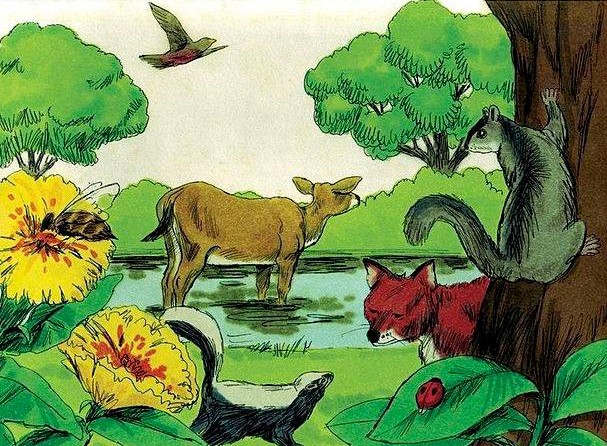
Sweet Publishing, CC BY-SA 3.0, via Wikimedia Commons
What does the Bible say about the environment and our responsibility to it? Many think that the Bible only deals with ethical morals (i.e., do not lie, cheat or steal). Or perhaps it only concerns an after-life in heaven. But the relationship between mankind, the earth, and life on it, along with our responsibilities are introduced right on the first page of the Bible.
The Bible states that God created mankind in His Image. At that same time He also gave mankind his first charge. As the Bible records it:
26 ទ្រង់ក៏មានព្រះបន្ទូលថា ចូរយើងធ្វើមនុស្ស ឲ្យដូចជារូបយើង ឲ្យមានភាពដូចយើង ហើយឲ្យមានអំណាចលើត្រីសមុទ្រ សត្វហើរលើអាកាស និងសត្វជើង៤ដែលនៅលើផែនដីទាំងមូល ព្រមទាំងសត្វលូនវារដែលវារនៅលើផែនដីផង
លោកុប្បត្តិ 1:26-28
27 ទ្រង់ក៏បង្កើតមនុស្សឲ្យដូចរូបអង្គទ្រង់ គឺបានបង្កើតគេឲ្យចំនឹងរូបអង្គទ្រង់នោះឯង ក៏បង្កើតគេឡើងជាប្រុសជាស្រី
28 ទ្រង់ប្រទានពរដល់គេ ហើយមានព្រះបន្ទូលថា ចូរបង្កើតកូនឲ្យចម្រើនជាច្រើនឡើង ឲ្យមានពេញពាសលើផែនដីចុះ ត្រូវបង្ក្រាបផែនដី ហើយមានអំណាចលើត្រីសមុទ្រ សត្វហើរលើអាកាស និងជីវិតផងទាំងឡាយដែលកម្រើកនៅផែនដីផង
God retains Ownership
Some have misunderstood the commands ‘subdue’ and ‘rule’ to imply that God gave the world to mankind to do as we want with it. We are thus free to ‘rule’ over the earth and its ecosystems to our every whim and fancy. In this way of thinking God washed his hands of His creation right from the beginning. Then He gave it to us to do as we like.
However the Bible never states that mankind now ‘owns’ the world to do with it as they please. Many times throughout the Bible God asserts his ongoing ownership of the world. Consider what God said through Moses ca 1500 BCE
5 ដូច្នេះ បើឯងរាល់គ្នានឹងស្តាប់តាមអញឥឡូវ ហើយកាន់តាមសេចក្ដីសញ្ញារបស់អញ នោះឯងរាល់គ្នានឹងបានដាច់ជារបស់ផងអញលើសជាងអស់ទាំងសាសន៍ ដ្បិតផែនដីទាំងមូលជារបស់ផងអញ
និក្ខមនំ 19:5
And through David ca 1000 BCE
10 ដ្បិតអស់ទាំងសត្វនៅព្រៃសុទ្ធតែរបស់អញ ព្រមទាំងហ្វូងសត្វទាំងប៉ុន្មាននៅលើភ្នំទាំងពាន់ផង
ទំនុកដំកើង 50:10-11
11 អញស្គាល់អស់ទាំងសត្វស្លាបនៅលើភ្នំ ហើយសត្វព្រៃទាំងឡាយជារបស់ផងអញដែរ។
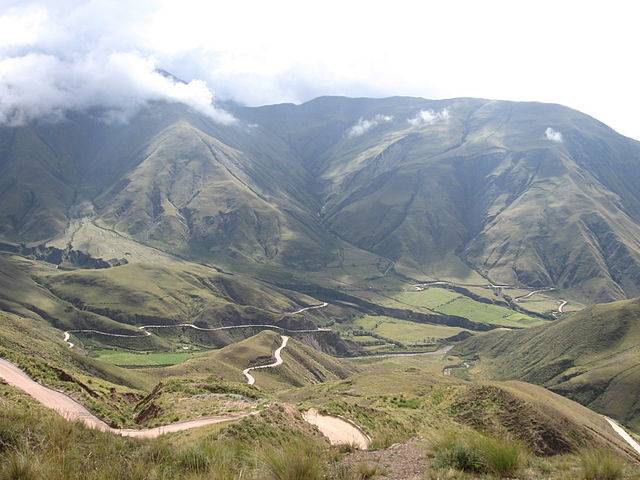
Jesus himself taught that God retains an active interest in, and detailed knowledge of, the state of animals on this world. As he taught:
29 តើគេមិនលក់ចាប២ថ្លៃ១លុយទេឬអី តែគ្មានចាបណាមួយធ្លាក់ទៅដី ឥតព្រះវរបិតានៃអ្នករាល់គ្នាជ្រាបឡើយ
ម៉ាថាយ 10:29
We are Managers
The more accurate way of understanding the roles given to mankind is to think of us as ‘managers’. Jesus used this picture many times in his teachings to describe the relationship between God and humans. Here is one example,
ទ្រង់ក៏មានព្រះបន្ទូលទៅពួកសិស្សថា មានសេដ្ឋីម្នាក់ ដែលគេមកប្តឹងលោក ពីអ្នកត្រួតត្រាលើរបស់ទ្រព្យលោកថា គាត់ចាយបង្ហិនបង្ហោចទ្រព្យសម្បត្តិលោកជាច្រើន
លូកា 16:1-2
2 លោកក៏ហៅអ្នកនោះមកសួរថា តើរឿងអ្វីដែលអញឮនិយាយពីឯង ចូររៀបរាប់ប្រាប់ពីការឯងត្រួតត្រានោះមកមើលពីព្រោះឯងនៅត្រួតត្រាការទៀតពុំបានទេ
In this parable God is the ‘rich man’ – the owner of everything – and we are the managers. At some point we will be evaluated on how we have managed what He owns. Jesus consistently uses this relationship in many of his teachings.

In this way of thinking we are like pension fund managers. They do not own the pension funds – the people paying into their pensions are the owners. The fund managers have been delegated authority to invest and manage the pension fund for the benefit of the pensioners. If they are incompetent, lazy or do a bad job the owners will replace them with others.
So God remains the ‘owner’ of creation and has delegated to us the authority and the responsibility of managing it properly. Therefore it would be prudent to know what His goals and interests are with respect to creation. We can learn this by surveying some of His commands.
God’s heart for His Creation revealed through His commands
After the Passover, and the giving of the Ten Commandments, Moses received further detailed instructions on how the fledgling Israelite nation should establish itself in the Promised Land. Consider the instructions that give visibility to the values in God’s heart concerning the environment.
ព្រះយេហូវ៉ាទ្រង់បង្គាប់ដល់ម៉ូសេនៅលើភ្នំស៊ីណាយ
លេវីវិន័យ 25:1-4
2 ឲ្យប្រាប់ដល់ពួកកូនចៅអ៊ីស្រាអែលថា កាលណាឯងរាល់គ្នាចូលទៅក្នុងស្រុកដែលអញឲ្យដល់ឯង នោះដីនៅស្រុកនោះត្រូវមានពេលឈប់សម្រាកថ្វាយព្រះយេហូវ៉ា
3 គឺត្រូវឲ្យឯងរាល់គ្នាសាបព្រោះនៅស្រែឯង ហើយថែរក្សាចម្ការទំពាំងបាយជូររបស់ឯងអស់៦ឆ្នាំ ព្រមទាំងប្រមូលផលផ្លែផង
4 តែដល់ឆ្នាំទី៧ នោះជាឆ្នាំឈប់ផ្អាកឲ្យដល់បានសម្រាកវិញ គឺជាឆ្នាំឈប់សម្រាកថ្វាយព្រះយេហូវ៉ា មិនត្រូវឲ្យធ្វើស្រែ ឬលួសកាត់ទំពាំងបាយជូររបស់ឯងឡើយ
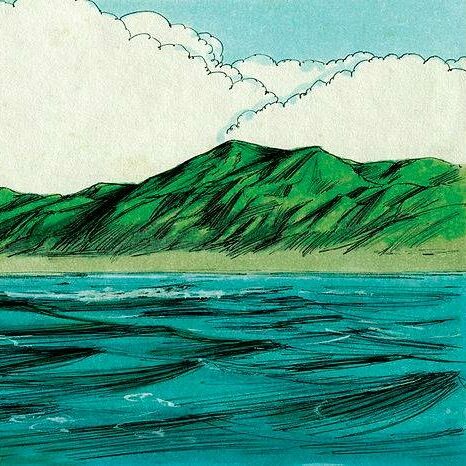
Sweet Publishing, CC BY-SA 3.0, via Wikimedia Commons
Unique among all the other nations and their practices back then (3500 years ago) and even different than typically practiced today, this command ensured that the land, remained uncultivated every seventh year. Thus the land could have a regular, periodic ‘rest’. During this rest, nutrients that had been depleted under heavy agriculture could replenish. This command shows that God values long term environmental sustainability over short term extraction. We can extend this principle to environmental resources like fish stocks. Limit the fishing either seasonally or pause fishing until over-fished stocks can recover. This command applies as an extended principle to all activities that deplete our natural resources, whether water, wildlife, fish stocks, or forests.
This guideline seems environmentally beneficial. But you are probably wondering how the Israelites were to eat on the year that they did not plant. These were people just like us and they likewise asked this question. The Bible records the exchange:
18 ដូច្នេះ ត្រូវឲ្យកាន់តាមអស់ទាំងច្បាប់អញ ហើយរក្សាសេចក្ដីបញ្ញត្តរបស់អញទាំងប៉ុន្មាន ព្រមទាំងប្រព្រឹត្តតាមផង នោះឯងរាល់គ្នានឹងបាននៅក្នុងស្រុកដោយសុខសាន្ត
លេវីវិន័យ 25:18-22
19 ហើយស្រុកនឹងបង្កើតផលឲ្យឯងរាល់គ្នាបានបរិភោគឆ្អែត ឯងរាល់គ្នានឹងបាននៅដោយសុខសាន្ត
20 បើឯងរាល់គ្នាសួរថា មើល ក្នុងឆ្នាំទី៧នេះ យើងមិនសាបព្រោះ ឬប្រមូលផលអ្វីរបស់យើងសោះ ដូច្នេះ តើយើងរាល់គ្នានឹងបានអ្វីបរិភោគ
21 នោះគឺអញនឹងផ្តល់ពររបស់អញដល់ឯងរាល់គ្នានៅឆ្នាំទី៦ នៅឆ្នាំនោះនឹងបង្កើតផលឲ្យល្មមគ្រប់៣ឆ្នាំវិញ
22 រួចដល់ឆ្នាំទី៨ ត្រូវឲ្យឯងរាល់គ្នាសាបព្រោះទៅចុះ តែនឹងបរិភោគផលចាស់ដរាបដល់ឆ្នាំទី៩ ឯងរាល់គ្នាត្រូវបរិភោគផលចាស់នោះរហូតដល់បានច្រូតផលថ្មីហើយ។
Concern for welfare of animals
4 មិនត្រូវឃ្លុំមាត់គោដែលកំពុងបញ្ជាន់ស្រូវឡើយ។
ចោទិយកថា 25:4
The Israelites were to treat the beasts of burden well. They should not withhold their animals treading on the grain (so it would thresh) from enjoying some of the fruit of their effort and work.
11 ដូច្នេះ តើមិនគួរឲ្យអញអាល័យចំពោះក្រុងនីនីវេ ជាទីក្រុងយ៉ាងធំនេះ ដែលមានមនុស្សជាង១សែន២ម៉ឺននាក់ ជាពួកអ្នកដែលមិនស្គាល់ស្តាំ មិនស្គាល់ឆ្វេងសោះ ព្រមទាំងហ្វូងសត្វយ៉ាងច្រើនផងទេឬអី។:៚
យ៉ូណាស 4:11
This comes from the well-known book of Jonah. In this book a giant marine creature had swallowed Jonah before he obeyed his call to preach repentance to the wicked citizens of Nineveh. Angry with God that they had repented from his preaching and so had averted His judgment, Jonah complained bitterly to God. The quote above was God’s response to his complaint. Apart from revealing God’s concern for the people of Nineveh, He also reveals His concern for the animals. God was pleased that the animals were spared because the people of Nineveh repented.
Judgment for those harming the earth
The Book of Revelation, the final book of the Bible offers visions of the future of our world. The pervading theme of the future it foresees centers on coming judgment. The coming judgment is triggered for a number of reasons, including:
18 អស់ទាំងសាសន៍បានមានសេចក្ដីកំហឹង ហើយសេចក្ដីខ្ញាល់ទ្រង់ក៏មកដល់ ជាពេលកំណត់ ដែលត្រូវជម្រះពួកមនុស្សស្លាប់ ហើយប្រទានរង្វាន់ដល់ពួកហោរា ពួកបរិសុទ្ធ និងអស់អ្នកដែលកោតខ្លាចដល់ព្រះនាមទ្រង់ គឺជាពួកបាវបម្រើទ្រង់ទាំងតូចទាំងធំដែរ ហើយជាពេលត្រូវបំផ្លាញពួកអ្នកដែលបង្ខូចផែនដីផង។
វិវរណៈ 11:18
In other words, the Bible predicts that the mankind, instead of managing the earth and its ecosystems in a manner consistent with the will of its owner, will ‘destroy the earth’. This will trigger judgment to destroy those guilty.
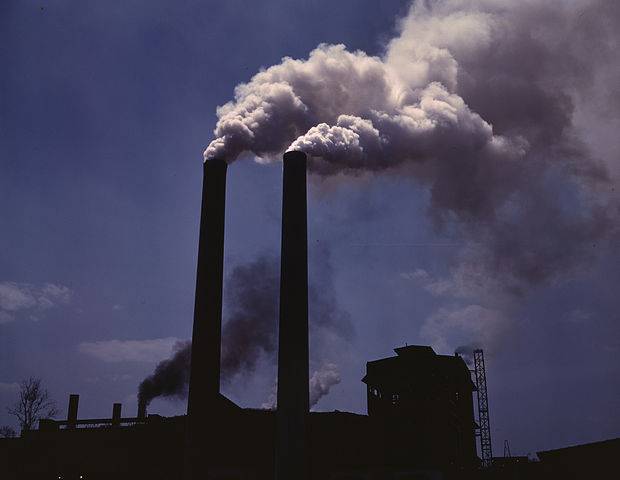
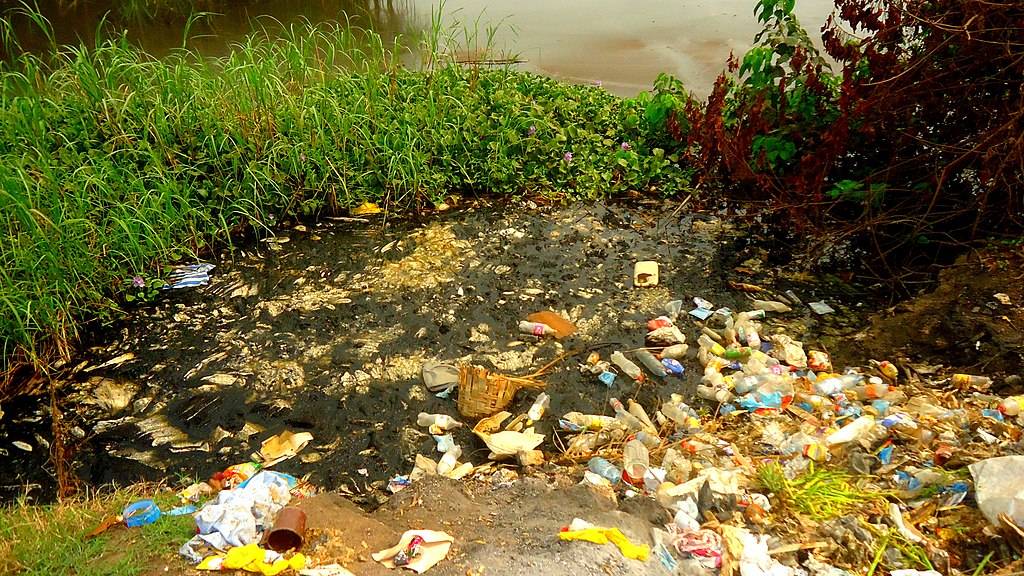
CC BY-SA 4.0 តាមរយៈ Wikimedia Commons
What are some signs of the ‘end’ that we are destroying the earth?
25 កាលណោះ នឹងមានទីសម្គាល់នៅក្នុងព្រះអាទិត្យ ក្នុងព្រះចន្ទ និងក្នុងអស់ទាំងផ្កាយ ហើយនៅលើផែនដី នឹងមានសេចក្ដីលំបាកនៅគ្រប់ទាំងសាសន៍ និងសេចក្ដីទ័លគំនិត ដោយព្រោះសូរសន្ធឹករបស់សមុទ្រ និងរលក
លូកា 21:25
8 ទេវតាទី៤ក៏ចាក់ពីចានខ្លួន ទៅលើព្រះអាទិត្យ រួចព្រះអាទិត្យបានអំណាចនឹងធ្វើឲ្យមនុស្សត្រូវខ្លោច ដោយសារភ្លើង
វិវរណៈ 16:8-9
9 មនុស្សលោកក៏ត្រូវខ្លោចទៅ ដោយអំណាចក្តៅជាខ្លាំង តែគេមិនបានប្រែចិត្ត ដើម្បីនឹងលើកសរសើរដល់សិរីល្អនៃព្រះទេ គឺគេប្រមាថដល់ព្រះនាមព្រះ ដែលមានអំណាចលើសេចក្ដីវេទនាទាំងនោះវិញ។
These signs written down 2000 years ago sound like the rising sea levels and increased intensity of ocean storms we witness today as part of global warming. Maybe we should heed the ancient warning.
What can we do to help our environment?
Here are some steps we can take to work towards a better environment:
- Lower your waste output by reusing products as much as you can before recycling them. Recycle items that can be processed and re-used, such as paper, plastic, and metal.
- Plastics harm the environment, so decreasing the plastic use is an easy first step. You can take simple steps such as carrying a water bottle with you instead of buying water in plastic bottles. Reuse your plastic shopping bags. Use metal or glass containers to store food. Some snacks and foods are still packaged with plastic. You can try to buy these in bulks and then store them in reusable containers.
- Water is an important aspect of the environment. Conserve water by taking precautions such as turning off taps when you are not using them. Repair dripping pipes and faucets.
- Use energy efficient products. For example, using energy-efficient light-bulbs is not only better for the environment (with a lower carbon footprint) but will also save your energy costs.
- Use public transportation instead of your own car. This is not always the easiest step to take because they are far more convenient than walking or taking the bus. But try walking short distances to get some exercise and take a step in protecting the environment. If the weather is nice try bicycling. Buying electrical cars instead of fossil-fuel burning cars is another way we can reduce the carbon emission caused by cars.
- Use environment-friendly products which do not harm the environment. These include organic foods or biodegradable cleaning products.
- Do not litter. Because of littering many plastics wash into the oceans and bodies of fresh water.
- Remember that small changes can make a big difference. Whatever step you take towards a protecting the environment if you maintain it throughout your life will make a difference.
- Pass on these tips and strategies to others.
- Educate people, especially those younger, about the environment and the importance of protecting it. Social media is a big part of our lives. Use social media to share information about environmental issues and how we can protect it.
- Practice these preventative measures so you can set an example for others. People are more likely to adopt a new habit when they witness other people practicing it.